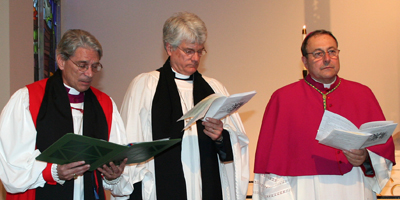
 CHARLESTON—Bishop Robert E. Guglielmone met with religious leaders for two days of interfaith dialogue at Camp St. Christopher on April 29-30.
CHARLESTON—Bishop Robert E. Guglielmone met with religious leaders for two days of interfaith dialogue at Camp St. Christopher on April 29-30.
The small group talked, prayed and shared laughter. They acknowledged the differences between their denominations and looked for ways to work together for the good of the state.
“We can find ways of reaching more people in the message of Jesus Christ if we recognize we are not in competition with one another,” Bishop Guglielmone said.
Father C. Alexander McDonald, diocesan administrator for ecumenical and interreligious affairs, said the purpose of the LARCUM retreat was for members to reaffirm their covenant and build relationships.
Getting to know one another and their individual concerns is an important step for the Lutheran, Anglican, Roman Catholic and United Methodist group because three of their five bishops are new to the position.
Bishop Herman R. Yoos III of the S.C. Synod of the Evangelical Lutheran Church in America was appointed two years ago; Bishop Guglielmone was ordained to the Diocese of Charleston just over a year ago; and Bishop-elect W. Andrew Waldo was selected to lead the Episcopal Diocese of Upper South Carolina at the end of 2009.
The other two bishops have been around longer. Bishop Mark Lawrence of the Episcopal Diocese of South Carolina was first elected in 2006 and Bishop Mary Virginia Taylor of the S.C. United Methodist Conference has served since 2004.
Bishop Lawrence said LARCUM events allow a group of extremely busy religious leaders to join together and grow in unity.
“The chief thing that has happened and will continue to happen is growth in relationship with one another,” he said.
Bishop Yoos said the ecumenical movement is not about ignoring the differences between denominations, but accepting them and moving forward by emphasizing the beliefs they have in common.
“As we share the state, it is imperative that we cooperate and work together for God’s mission,” Bishop Yoos said.
The bishops agreed that religious unity could improve many issues that affect the state. A few that were mentioned include schools, race relations, health concerns, the prison system and immigration.
Bishop Guglielmone said the denominations may have a different modus operandi, but they all have the same objective, which is to proclaim the Gospel of Jesus.
“Ecumenism is important because if we don’t work together we would not be working the way Jesus asks us to in the Scripture,” he said.
The retreat also featured Brenda Kneece, executive minister of the S.C. Christian Action Council, who spoke about her group’s purpose to coordinate the efforts of various congregations and clergy.
She said the ecumenical movement is comprised of 16 denominations for a total of about 1 million people across the state. The numbers, she added, underscore the commandment that you do no harm, not even to one denomination.
“The unity to which I am committed is best when we are focused on worshipping God,” Kneece said.
LARCUM started in 1995 as a way for members of four Christian denominations to learn more about each other’s beliefs and develop new ways of furthering unity.
